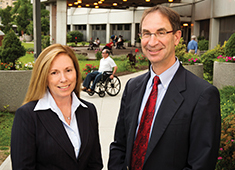Office of Research & Development |
 |
View: Recent Awards || All Awards
 VA's Dr. William A. Bauman (right) and Dr. Ann M. Spungen received the Samuel J. Heyman Science and Environment Medal for their work on behalf of Veterans and others with spinal cord injury. (Photo courtesy of the Partnership for Public Service)
VA's Dr. William A. Bauman (right) and Dr. Ann M. Spungen received the Samuel J. Heyman Science and Environment Medal for their work on behalf of Veterans and others with spinal cord injury. (Photo courtesy of the Partnership for Public Service)
William A. Bauman, M.D., and Ann M. Spungen, Ph.D., director and associate director, respectively, of VA's Rehabilitation Research and Development National Center of Excellence for the Medical Consequences of Spinal Cord Injury, received the Samuel J. Heyman Science and Environment Medal on Sept. 22, 2014.
The Science and Environment Medal is awarded to federal employees who have made a significant contribution to the nation. It is one of several Service to America medals, or "Sammies," awarded each year by the Partnership for Public Service. This year, eight award winners were chosen from 33 finalists and almost 400 nominees.
The VA researchers, who have been working together for a quarter of a century, were recognized in a ceremony in the Andrew Mellon Auditorium in Washington, D.C. VA Secretary Robert McDonald presented Bauman and Spungen their awards.
"Many of our facilities perform groundbreaking work, which serves as a model for health care research across the nation," said Secretary McDonald. "I am proud of William and Ann. Any research institution would be proud to have these leading scientists, but they have chosen to dedicate their careers to serving Veterans at VA, and we are proud to call them our own."
In 2001, Bauman and Spungen established the VA's Rehabilitation Research and Development National Center of Excellence for the Medical Consequences of Spinal Cord Injury in the Bronx, N.Y., where Spungen most recently tested a new bionic walking assistance system that enables people with paralysis to stand, walk, and climb stairs. The Israeli-made device, approved by the U.S. Food and Drug Administration in June 2014, is called the ReWalk.
As part of their collaboration, Bauman and Spungen have made great strides in understanding the effects of spinal cord injury on the body. Their work led to the conclusion that people with spinal cord injury are at a markedly increased risk for heart disease. They were also the first to describe, and then treat, an asthma-like lung condition common in those with higher levels of paralysis. They have developed ways to make it easier for paralyzed patients to have successful colonoscopies. With other researchers in their unit, Bauman and Spungen formulated new drug combinations to raise low blood pressure and they have overseen the development of treatments to reduce bone loss shortly after spinal cord injury. Their work has advanced the understanding and treatment of chronic, non-healing pressure ulcers. Researchers under their direction also are making strides toward improving understanding of body temperature regulation and the effect of swings in body temperature on one's ability to think.
Bauman has worked at the Bronx VA hospital for 35 years, starting in the laboratory of the late Rosalyn Sussman Yalow, VA physicist and Nobel Prize winner. Bauman said he made up his mind from the start to devote himself to patients with spinal cord injury who, at the time, were largely marginalized and overlooked by physicians with training in general medicine.
"I would say our center's greatest accomplishment has been to identify problems in persons with spinal cord injury that no one had appreciated prior to our work, and then to develop successful approaches to solve them," Bauman said. "Prior to our work, many of these problems were not realized to be important, or were ignored because it seemed that nothing could be done to improve them."
Spungen said she can recall being captivated by the sense of civic duty pervading Bauman's energetic sphere of medical research activity at the hospital.
"I got to the VA and met these incredible scientists and investigators who were here working for the Veterans and who were so intelligent, so open, and so kind. I just became enamored with the entire atmosphere and dug in, and I have been here ever since," Spungen said.
Dr. Michael E. Selzer, director of the Center for Neural Repair and Rehabilitation at Shriners Hospitals in Philadelphia, and a former director of Rehabilitation Research and Development for VA, said the team's work has had a dramatic impact: "Not long ago, a spinal cord injury was tantamount to an early death sentence, not because of the immediate effects of a paralyzing injury, but because of the many medical complications that followed. Now these patients have an almost normal life span and a greatly improved quality of life."
He described Bauman as "the single most important scientist and physician leading the way to improved medical management of persons with spinal cord injury."
Dr. Erik Langhoff, director of the James J. Peters VA Medical Center, added that Spungen has "made seminal contributions to spinal cord injury medicine."
Dr. Robert Ruff, VA's national director for neurology, said the work of Bauman and Spungen has had a wide-ranging impact, even beyond the SCI community. "The research is relevant not only to people with spinal cord injury, but to a larger population who are immobilized, from those with ALS to cancers, muscular dystrophy, multiple sclerosis, dementia or Parkinson's disease."